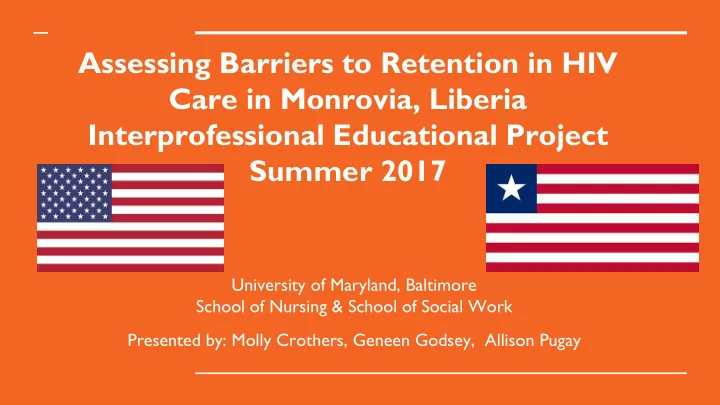

Assessing Barriers to Retention in HIV Care in Monrovia, Liberia Interprofessional Educational Project Summer 2017 University of Maryland, Baltimore School of Nursing & School of Social Work Presented by: Molly Crothers, Geneen Godsey, Allison Pugay
Background UMB’s first partnership with Liberia - Mother Patern College of Health Sciences Liberia: Baltimore: HIV rate: overall rate: 1.5% HIV rate: 1,245 - 4,699 per • • Urban rates: 2.5% to 2.9% 100,000 (1.2%- 4.7%) Rural rates: 0.8% 50% hold high school or college • 42.6% adult literacy degree • GNI per capita: $720 PPP GNI $57,000 PPP • • Key populations for both locations: MSM, minorities, IVDU, prisoners, and sex workers • https://www.unicef.org/infobycountry/liberia_statistics.html
Purpose ● Assess patients’ and facilitators’ perceptions of barriers to retention in care for persons living with HIV through focus group discussions and interviews . ● Observe and understand the Liberian healthcare system Methods Sample Hospital Assessment Questions: - What specialty / HIV services are offered? ● Interviews & Focus Groups - number of patient rooms, beds Home visits - Are there seats for waiting clients? - number of clinicians Peer support group - amount of hours worked ● Observational studies: - where do patients get their medications? Hospital and school assessments
Objective Findings Hospital assessments: NACP Director interview ● 1-3 HIV counselors ● Leading HIV care provider ● Wait time up to 6 hours Cenacolo Community ● Some open 3x/week only ● Pediatric HIV care ● Medication source on or off site Home Visits Charity Home ● Litter: broken glass, old needles ● Care for chronically ill patients ● Neglected road conditions ● Off-site medication source ● Free, but limited capacity ● Lack of clean water Catholic Church Peer Support group ● Mental health program ● Met once / month ● Sense of community ● Food ration attendance reward
Subjective Findings ● Cultural stigma against HIV ● Need for continued health awareness teaching ● Economic obstacles: - cost of care - short-staffed -limited (imported) resources
Activities by UMB Students ● MPCHS peer support group - “Tree of Hope” ● Charity Home HIV education presentations ● Health club game & cards for Charity home
Recommendation for future UMB trips to Liberia ● Continued study abroad opportunities with expanding assessment ● Global classrooms with nursing and social work students ● Training programs for nurses in Liberia
Impact on Professional Career We learned... - Multicultural communication - Schedule flexibility - Problem-solving skills - Interprofessional collaboration - Necessity of multiple disciplines for comprehensive patient care
Recommend
More recommend